Using a Club Campsite Charger
...and how much does it cost to tow with an EV in 2023?
Scotland to London, 524 miles, towing a caravan
Last week I needed to get from my home in the Outer Hebrides down to the South East of England pretty sharpish - with the dogs. This meant dragging the caravan all the way down with my Kia EV6.
Shenanigans getting off the island thanks to ferry disruptions gave me a window of just four hours between arriving into Oban at 4pm, and checking in to a campsite at 8pm before its shutters rolled down.
The 41 mile tow from my home to Lochboisdale ferry terminal in South Uist along island roads returned a phenomenal 2.4mi/kWh, as did the 85 mile trip along A-roads from Oban to Stirling. In theory, we could have made it all the way to Strathclyde Country Park without stopping, a total towing distance of 154 miles, and still had about 13-15% battery left. Wow.
However, with no EV chargers at the campsite at Strathclyde Country Park, we’d have only reached a battery level of about 45-50% the following morning by plugging the car into the caravan. That wouldn’t get us very far.
Therefore we had to stop and grab a fast charge on the way, and as usual made use of the spacious Low Carbon Hub at Castleview Park & Ride near Stirling, a great place (albeit unloved and suffering a lack of maintenance) where there’s plenty of room to park the caravan opposite the Fast Charger.
Including the faff of detaching and reattaching the caravan, a brief 5-10 minute wait for a charger, and the time it took to charge at a speed of 44 kW at the car (47 kW at the machine, don’t ask me what happens to the other 3 kW), we spent one hour here.
This mean absolutely flooring it all the way to Strathclyde Park to arrive before the 8pm deadline - which saw our consumption plummet to a summertime low of just 1.6mi/kWh.
Had there been EV chargers at the campsite, we could have continued our journey at a leisurely pace and arrived an hour earlier.
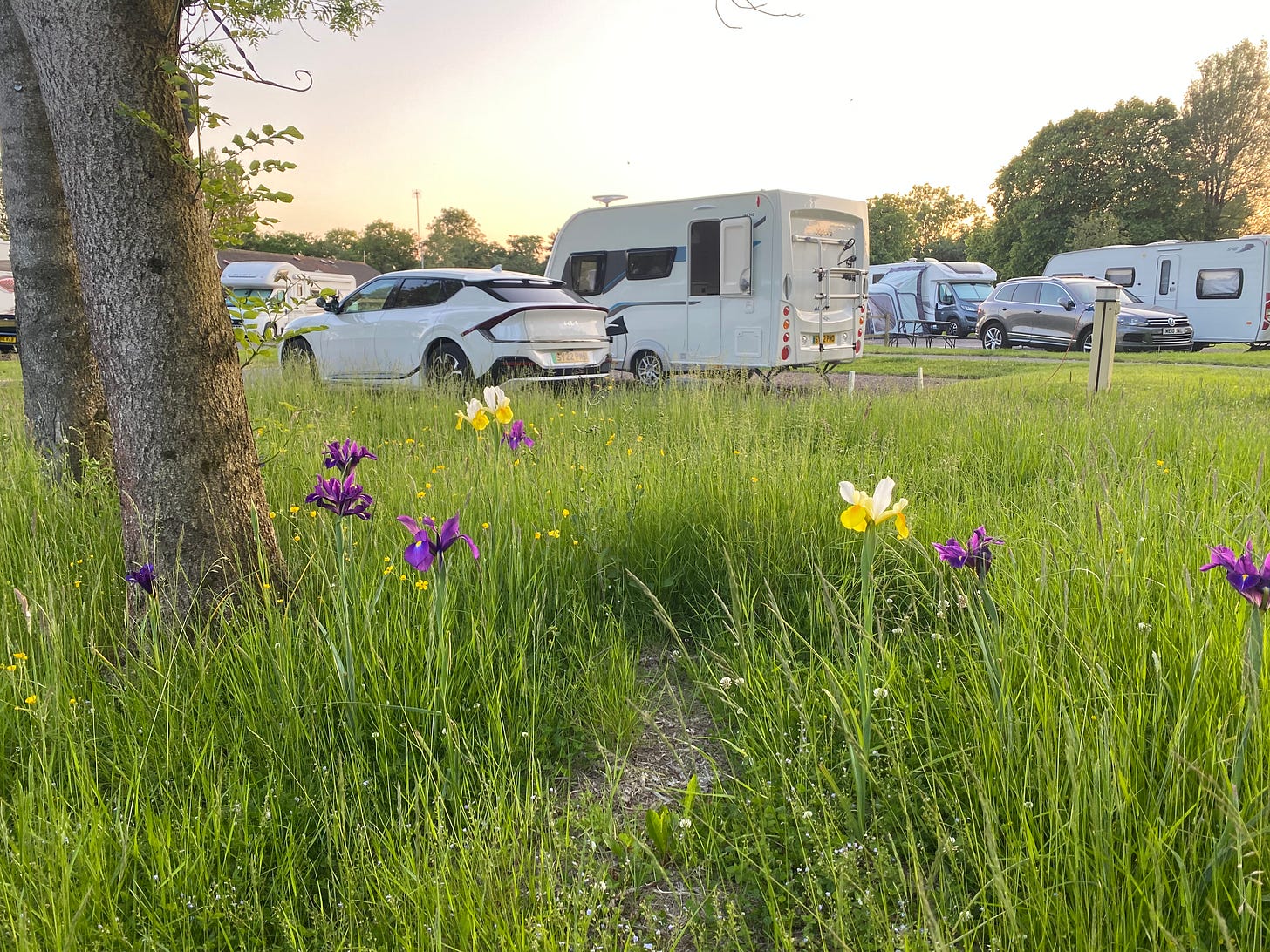
However, the next day, we experienced the flip side of the situation.
As I mentioned in the previous issue of Electric Touring, the Caravan and Motorhome Club has installed EV chargers at selected campsites. While some of the locations are holiday destinations where plugging in to the site supply for a few days would normally suffice, the location that jumped out to me was Clumber Park, a site that’s about half way up England and just off the A1. This is a superb place to overnight (just like Strathclyde Park, Chapel Lane, and Ferry Meadows) and the provision of EV chargers by the CAMC is a game-changer. Or is it?
We arrived at Clumber Park at 7.30pm with a battery state of 33%. Using just the site supply would only get us up to about 65% by the morning. This would have meant a stop at Peterborough Services the next day. But thanks to using the EV charger, I could get the battery to 100% by the next morning which meant I could make my destination (125 miles) in one hit, without the faff of a charging stop. This would also shave a whole hour off the journey. So YES, it REALLY IS a game-changer.
Using the CAMC Chargers
The bollards themselves at Clumber Park are privately run and are not part of any charging network, so there is no need to download yet another app or worry about phone signal, you just tap your payment card as you do with a Gridserve charger.
The biggest quirk that I’ve never come across before is that you need to select how much power you want and pre-pay. The amount of juice you can buy varies between 10 kWh and 60 kWh in increments of 10 kWh. The cost per kWh is currently 60.8p, which is about average.
The flaw with this system is that you need to be a mathematician to work out exactly how much power you need to buy. With my 77 kWh battery at 33%, how many kWh did I need to buy to get to 100%?
I ended up buying 30 kWh, which took about 3 hours of charging at a speed of 11kW. The chargers can deliver up to 22 kW, but most cars can only take 11 kW on AC.
Why didn’t I go up to 100% at the bollard?
30 kWh took the battery from 33% to 68% at a cost of 60.8p per kWh. I could have used the charger to get me to 100%, but any unused pre-paid power is NOT refunded, so the price per kWh might be even higher. I decided to move the car from the car park, and finish off the charge overnight by plugging in to the caravan.
Plugging in to the caravan overnight at a fixed fee of £9 would see the remaining 32% - about 25 kWh - working out to a lower cost of about 36p per kWh. There would also be no danger of overpaying for electricity I wouldn’t be able to use.
What about vans and motorhomes?
EV chargers in the car park are great for cars conveying tent campers or towing camping trailers and caravans, but would the Electric Tourer in a camper van be happy about spending the night in the car park? Or having to shift the whole rig out to the car park for five hours to charge up and then shuffle back into the main site? I don’t think so.
It’s the campsite operators who can make the biggest difference
While pull-through chargers and trailer parking bays at EV stations would help speed up journeys, lack of incentive means that none of this will be happening en masse any time soon.
As I found out by using the EV charger at Clumber Park, it’s in the hands of the campsite operators to improve the journey experience exponentially - with the incentive of attracting custom. Being able to use an EV charger on an overnight stop and leave with a 100% battery the next morning and NOT have to stop and charge is, indeed, a game-changer.
Maybe in future site operators might consider EV charging points on site in flexible spaces that may be used as parking areas or pitches by electric camper vans. New challenges such as Electric Touring will require new thinking - something that doesn’t always come easy in this wonderful pastime of ours!
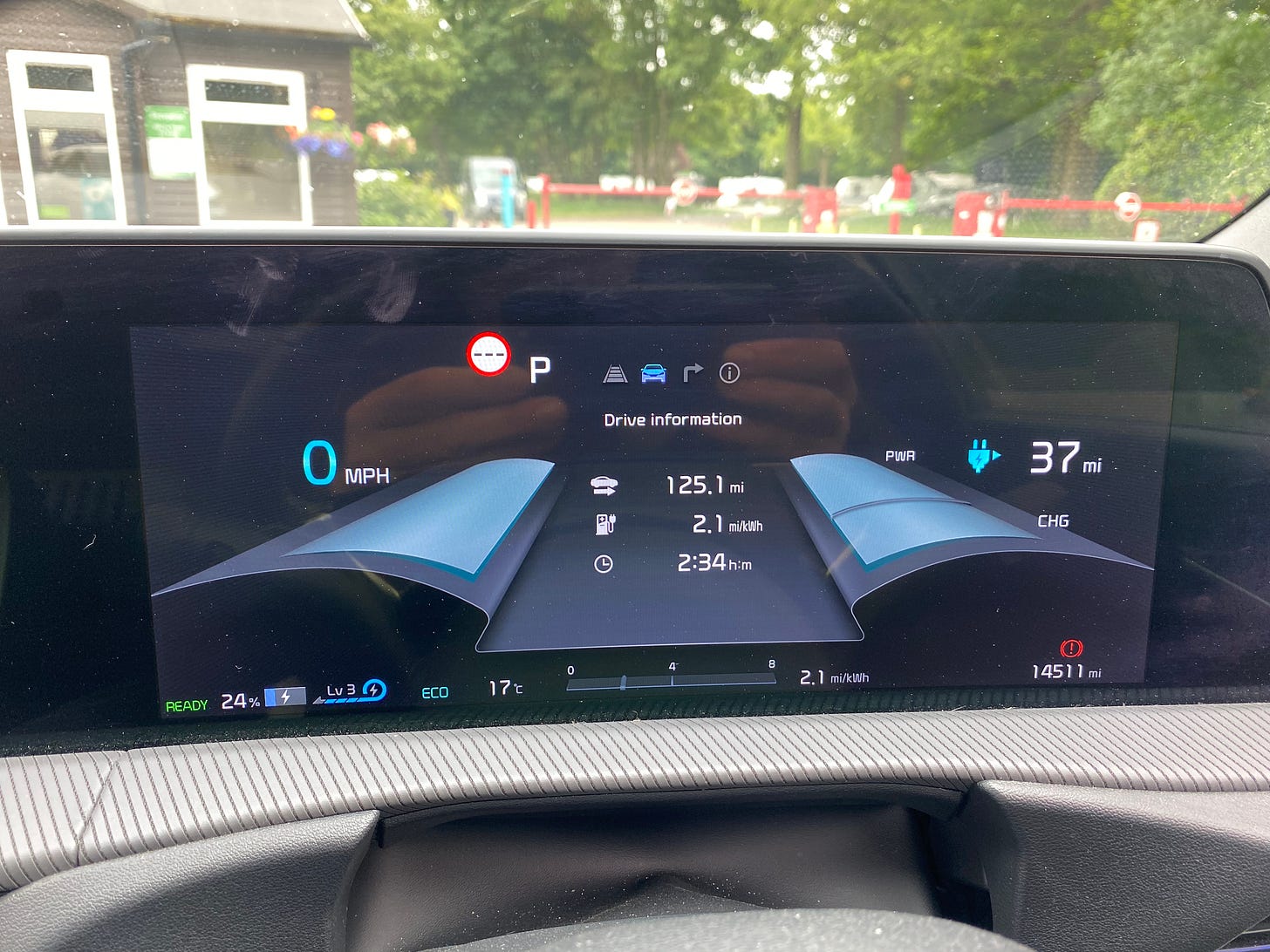
How much did my trip cost with an EV towing a caravan?
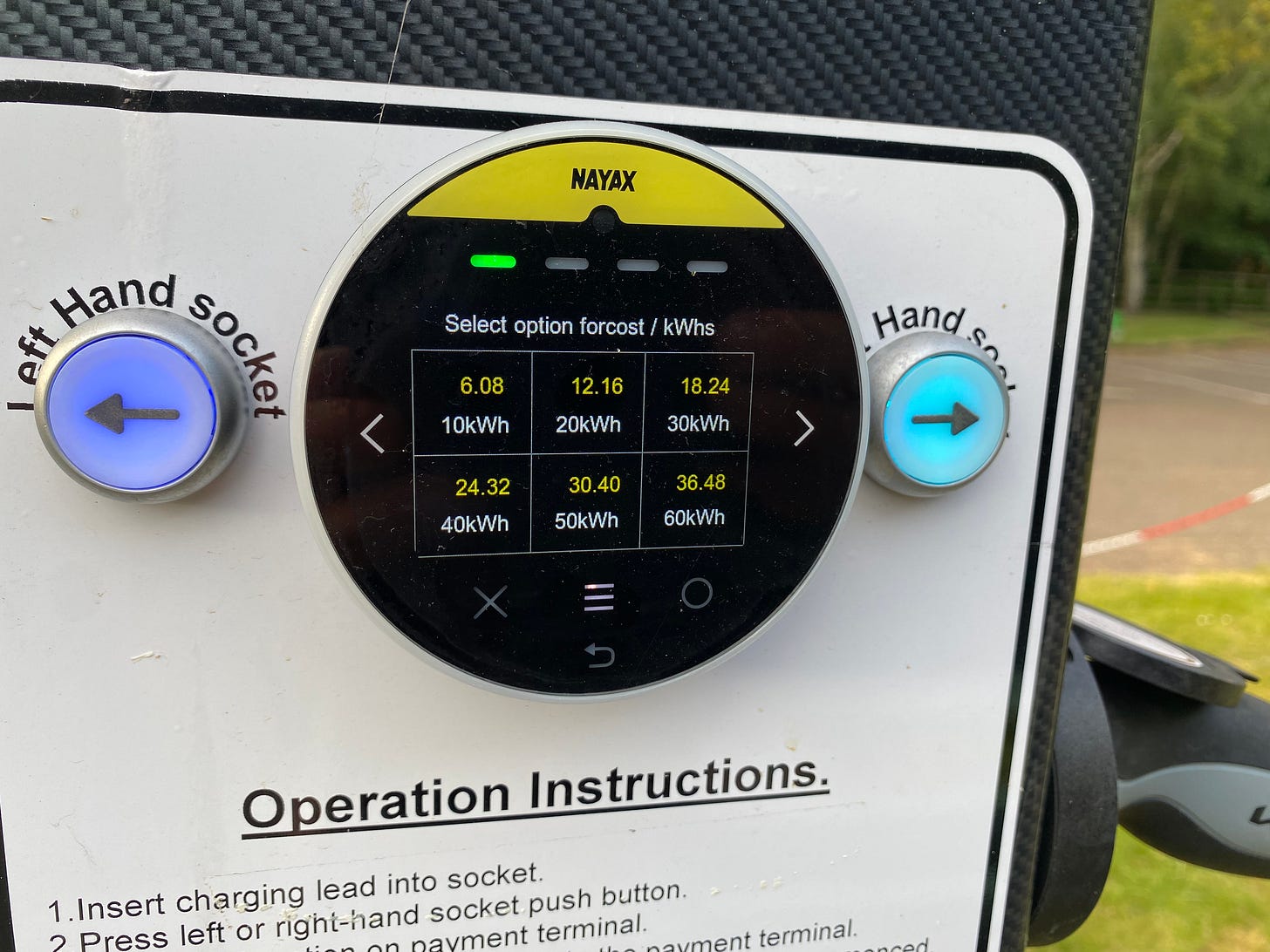
For my journey of 524 miles, I paid £90.88 in electricity. This is starting with a battery state of 100% and finishing with 100%. This is what I paid:
Castleview Park & Ride: £10.71 (35p/kWh)
Stathclyde Country Park CAMC: £9 (flat fee)
Ionity Gretna: £13.30 (25p/kWh through Kia promotion)
Gridserve Wetherby: £17.53 (69p/kWh)
Clumber Park CAMC: £27.24 (60.8p/kWh + £9 flat fee)
ARRIVAL AT DESTINATION
Hatfield Railway Station: £4.10 (free charging, £4.10 off-peak parking fee)
Commons Wood CAMC: £9 (flat fee, to bring up to 100%)
For the sake of comparison, if you had a petrol car that returned 28mpg when towing, you’d be using 18.71 gallons of petrol to cover the 524 miles.
18.71 gallons equates to 85 litres of petrol. At a price of £1.45 per litre, you’d be paying £123.25.
So for now at least, it’s still cheaper to tow with an EV.
Sorry it’s late
Apologies that this Newsletter is a few days late. Over the weekend I had zero upload ability with my 4G EE signal (thanks EE) which was followed by a travel day and then the migraine from hell. Fortunately we are now out the other side :)
Thanks for your patience.
Do you want to find out more about Electric Tow Cars?
Check out Chris’s excellent website Electric Towcars which is kept up to date with the latest electric tow car information.
Did you find value in this edition of Electric Touring?
If so, please subscribe and join the growing community of people who tour with EVs, or are interested in doing so.
Sharing is caring
I’d be really grateful if you could share this Newsletter with your friends online, on your social media platforms and on relevant forums that you enjoy.
Feeling Flush?
Electric Touring is self-funded and therefore completely independent. There are no adverts to spoil your experience. If you’d like to support us, and you’re in a position to do so, please consider Buying Me a Coffee using this link:
https://www.buymeacoffee.com/andrewditton
THANK YOU for your support.
About the author
Andrew Ditton is an award-winning videographer and leisure vehicle journalist with over 20 years experience. His audience is one of the largest and most engaged in the sector (source - Semrush) and his YouTube channel has over 73,500 Subscribers (December 2022). A lifelong caravanner, he is now touring with a Kia EV6 towing a Kimberley Caravans Xplore Activ 304.


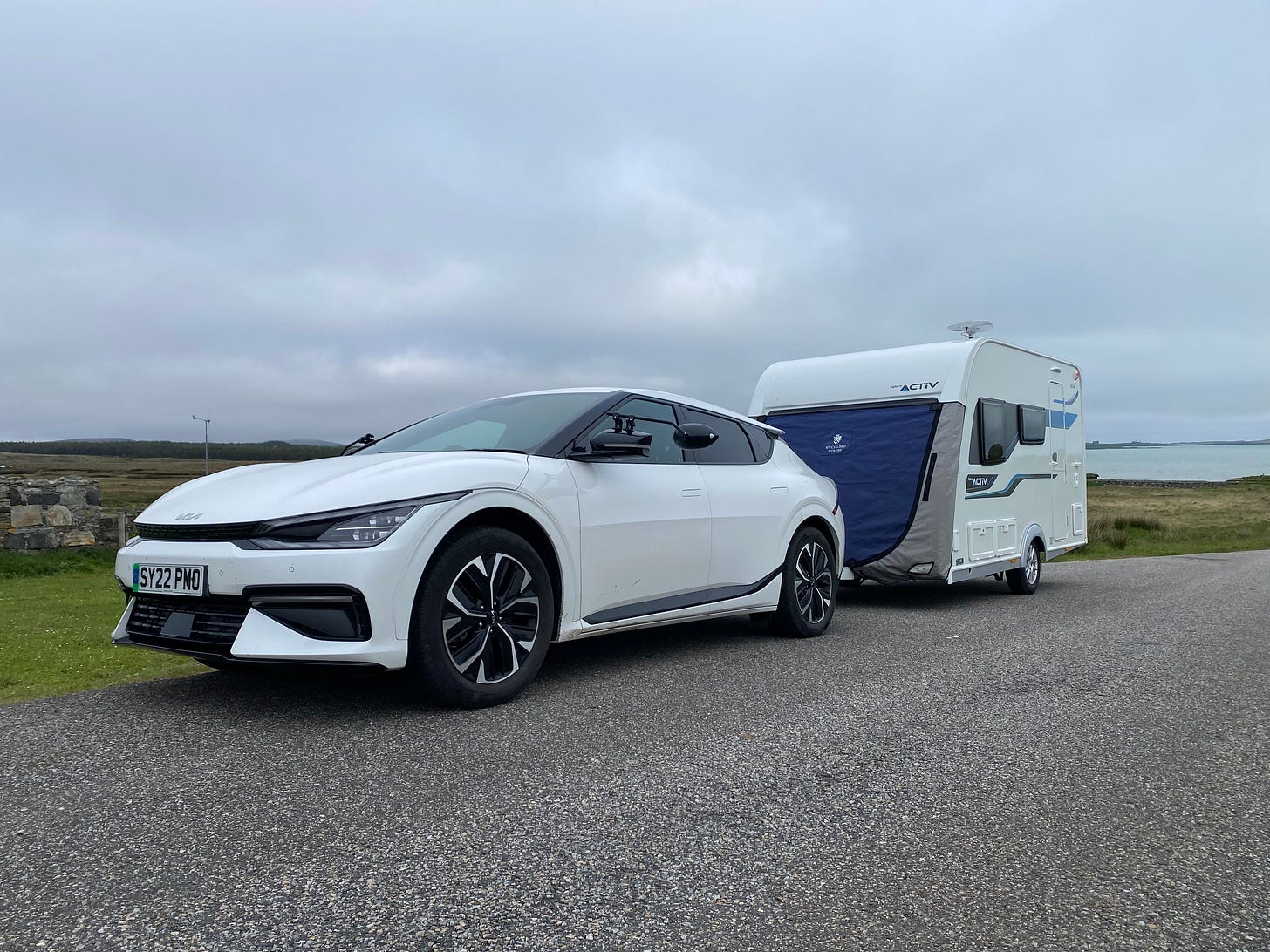
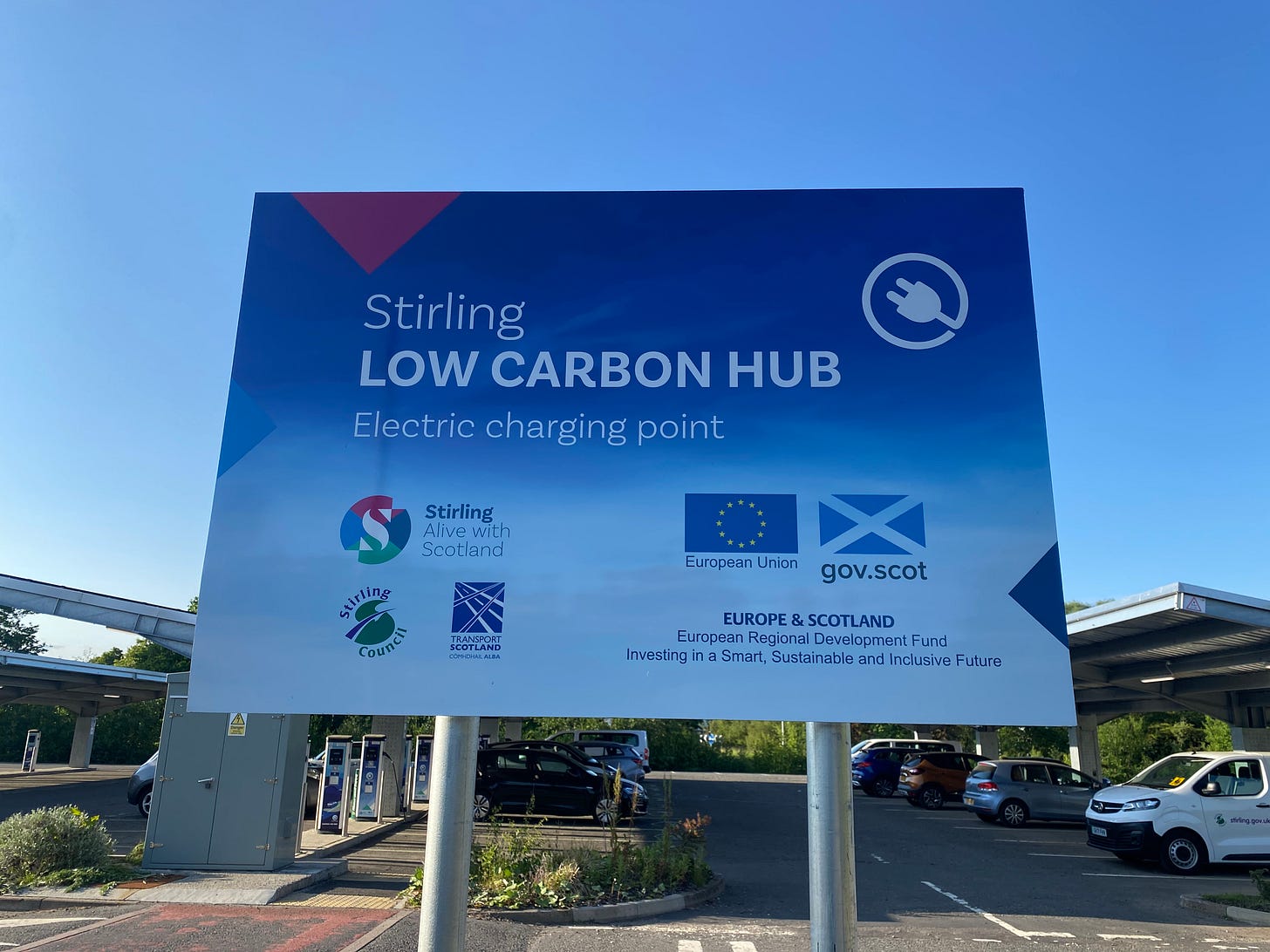
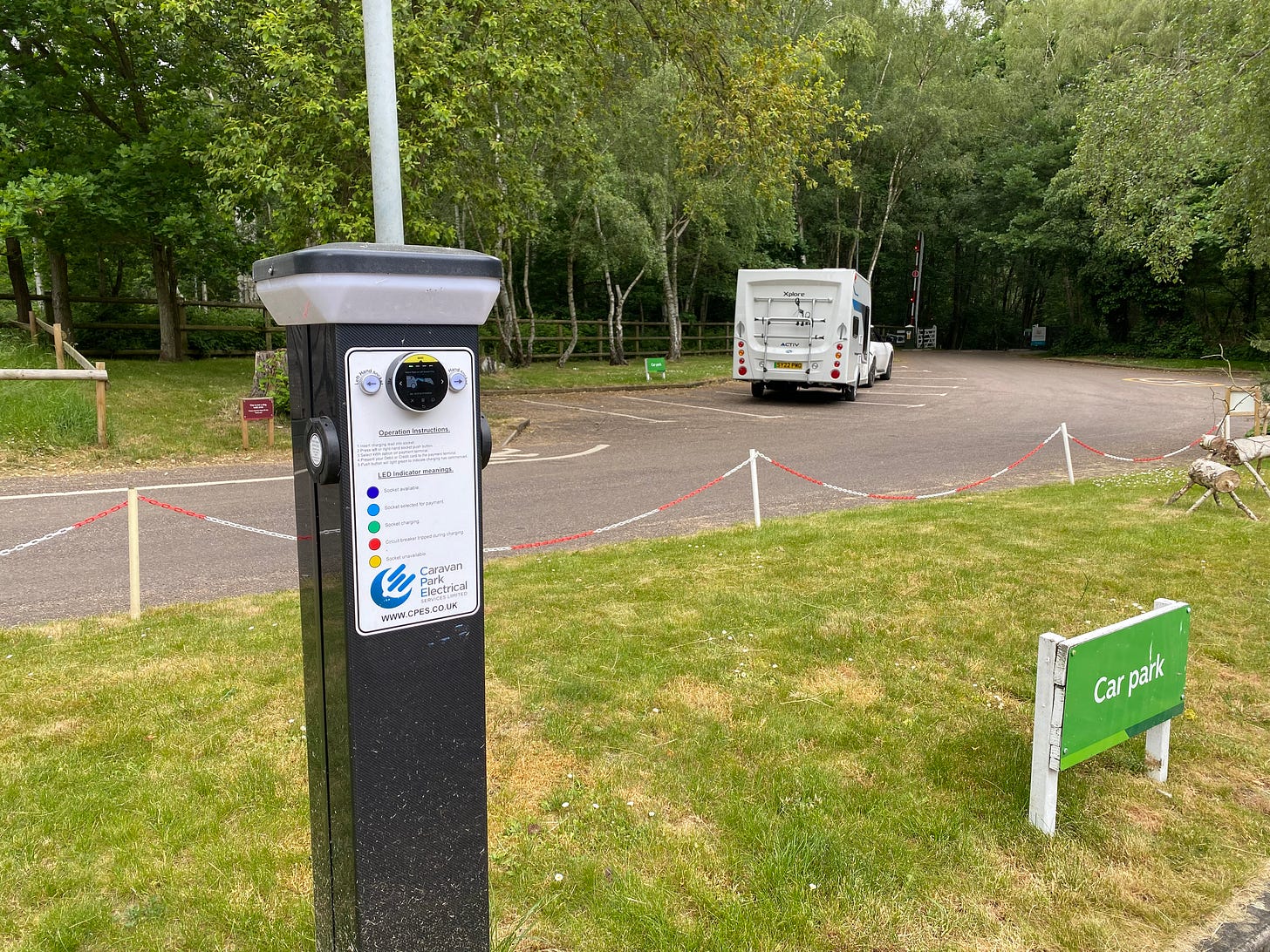
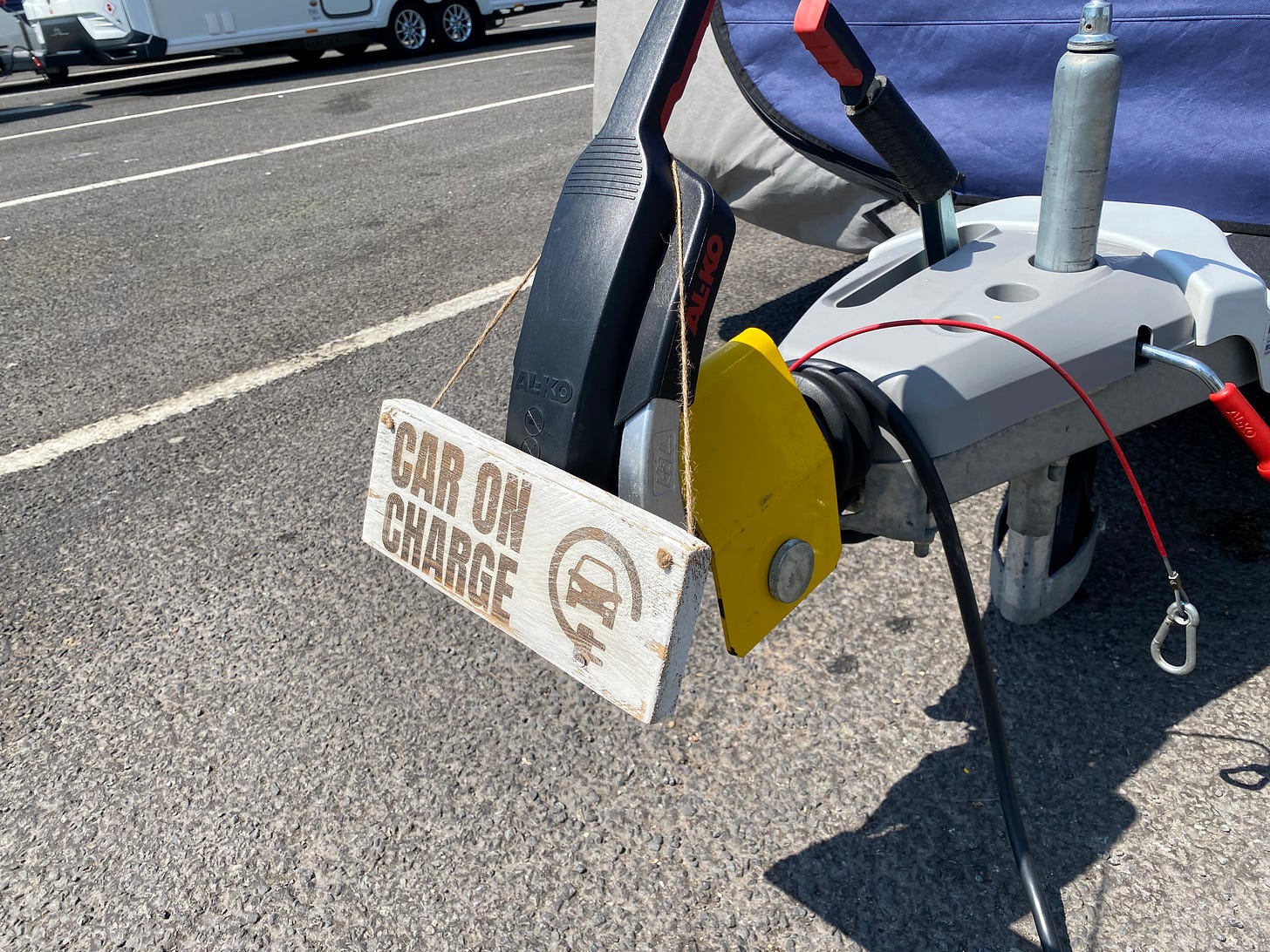
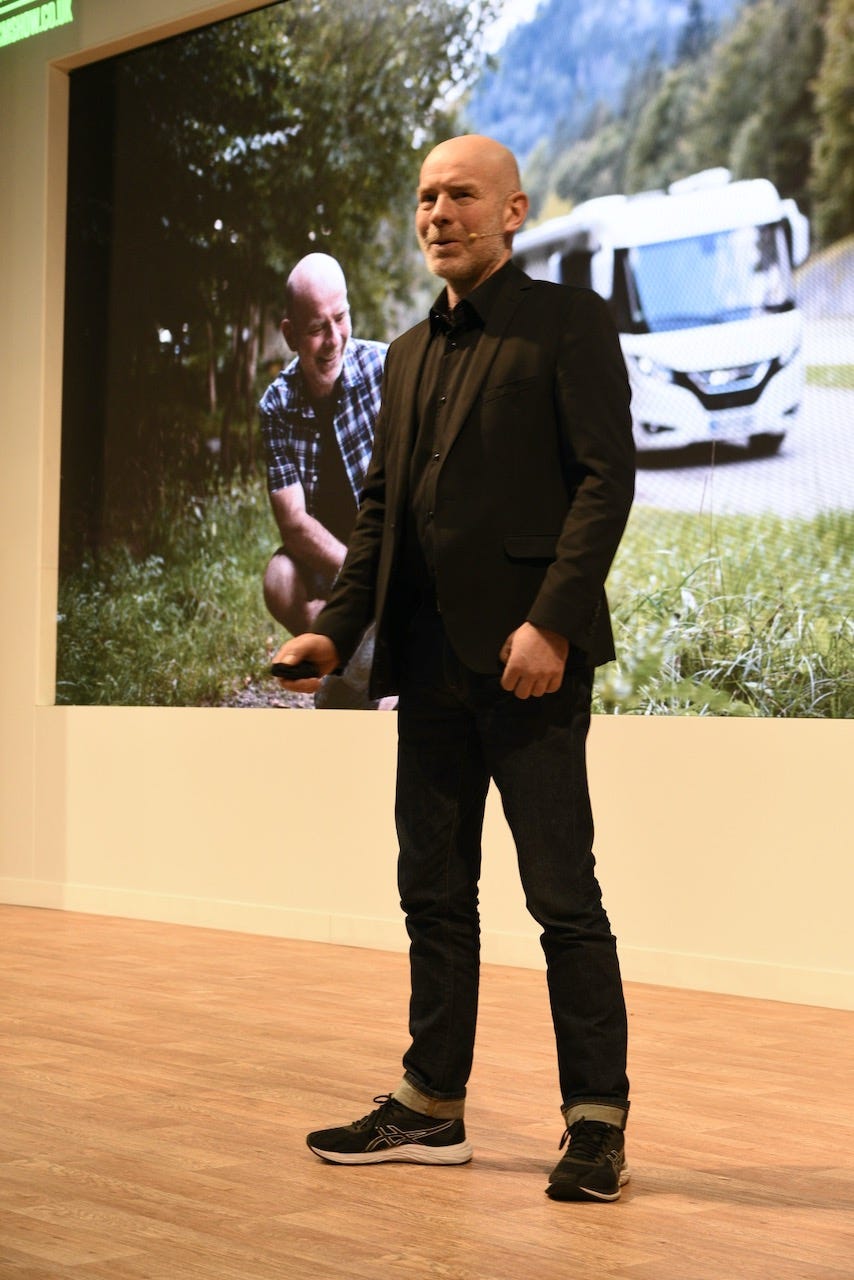
I do find the lack of knowledge at the campsites front eh staff a little odd. Do they get no training do you think? Having said that it just means they say “help yourself”. I’ve charged on club sites which were my destination (rather than passing through) and getting 24 hours for £9 works out much cheaper per kWh when timing isn’t so critical.
I only charge at Ionity (for about 27 eurocents per kWh), if not at home (for free) - and only overnight outside any paid space with my caravan.
Anyway, I would expect that the owners will eventually consider upgrading their installation to a 3 phase CEE once there are enough customers.